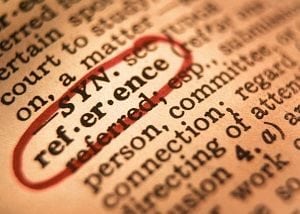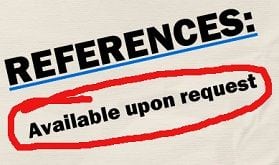Giving good references can be just as important to your career as getting them.  Are you ready? In a time when the average tenure at any given company is less than 3 years, strong networks are essential to avoid long periods of unemployment. To maintain a strong network, there are specific actions you can take to ensure you are both giving and receiving great references.
Are you ready? In a time when the average tenure at any given company is less than 3 years, strong networks are essential to avoid long periods of unemployment. To maintain a strong network, there are specific actions you can take to ensure you are both giving and receiving great references.
Have you recently been asked to be a reference? If you can honestly give a good reference, do it. If you cannot give a good reference I recommend not doing it because there are too many risks involved. Not only will you put yourself at risk for defamation lawsuits, but you also make it known to an employer that you have no trouble trashing someone else’s reputation. If you should ever find yourself applying to a company where someone who checked that reference has since then moved to and their only memory of you is how you trashed that other person, then you potentially lose that opportunity. Whatever you do, don’t be a reference for spite, so you can “get even” with that terrible employee/colleague by giving a bad reference. That may feel great for about 10 minutes, but it can do years of damage to YOU. It’s just not worth it.
While there are lots of reasons not to give bad references, there are significantly more reasons to give good ones. You will strengthen your networking relationship with that person, you will be introduced to more people in the industry in a positive way, and you will get your name out to more people in a favorable light based on what you say about the person. Remember the old saying, ‘What Peter tells me about Patrick, tells me more about Peter than it does Patrick.’
So how do you give a great reference? Be prepared. Let the person know you want to be ready for the call and to tell you when they believe someone will be calling. Let them know that if someone catches you without warning, you’ll certainly do your best, but you won’t be as effective for them as you could be. Also ask them about the types of jobs they are looking for and the locations they are considering. If you can offer any advice, or job leads, or even names of people you know at the companies they are applying to, you will immediately strengthen your networking ties with them. If you should ever need their help in the future, they will be more likely to help you in your time of need.
Next, if they have a LinkedIn.com account, give them a written recommendation online. Don’t ask, just do it, they will sincerely appreciate it and it will reaffirm to them that you are an advocate they can count on. If you need ideas of how to write them or what to say, visit my profile www.linkedin.com/in/paulcameron to get some ideas. Take note of what you do when you see them… did you look to see WHO was doing the recommending? So will visitors to their profile and they’ll see you. Recommending a high trafficked profile on LinkedIn brings YOU more traffic too. Food for thought.
Be sure to follow up with them. Go to your calendar and put a reminder in there for 3 weeks away to ask them how their search is going. Checking in shows you care and strengthens your relationship.
When they call to let you know someone may be calling you soon about a reference, now is the time to start preparing. Ask them for a copy of the resume they sent to the client. Since many people have multiple resumes, make sure you get the right copy. Ask them for a job description of the position they are applying to so you can ensure you are focused on the right things. Don’t be afraid to ask them directly what strengths they want you to talk about. Last but not least, ask them if they felt there were any areas in their interview where they felt they didn’t present themselves as well as they wished they had. For example, if they felt they didn’t express their experience in managing projects through to completion well enough, then you will be able to help make the case for them.
To GET a great reference, just reverse process!
First, just like the person described abo ve did with you, ask permission. It’s important to never assume people will be references for you, and you should always ask at the time you may need them. Meaning, just because Joe said he would be a reference for you 8 years ago does NOT mean he will be reference for you today. As a recruiter, I cannot tell you how many times I call references and hear, “Who? Wow, I haven’t worked with them or even spoken to them in years.” If you’re not sure if it’s been too long, call and ask them again.
ve did with you, ask permission. It’s important to never assume people will be references for you, and you should always ask at the time you may need them. Meaning, just because Joe said he would be a reference for you 8 years ago does NOT mean he will be reference for you today. As a recruiter, I cannot tell you how many times I call references and hear, “Who? Wow, I haven’t worked with them or even spoken to them in years.” If you’re not sure if it’s been too long, call and ask them again.
Then you need to be bold, and ask them a tough question.
You: “Joe, I’m hoping I can ask you a difficult question.”
Joe (your potential reference): “Sure, go ahead.”
You: “And please be completely honest with me, I promise, no matter what you say you won’t hurt my feelings, but it’s important that I know the answer to this. If someone were to call you and ask you what you felt my greatest weakness is, what would you tell them?”
It’s critical you hold true to your promise and not get upset with them, no matter what they say, and don’t get defensive about it. Just be appreciative of their honesty and let them know you will take note of it. Now here’s the important part, if they said anything that you feel would hurt your chances of getting a job, DON’T USE THEM AS A REFERENCE! You don’t need to tell them you’re not using them, just don’t give out their name, pick someone else. The greatest weakness question is an extremely common reference checking question, so you need to know what people are saying about you.
Next you need to refoc us the conversation on to your strengths, “Are there any strengths you feel I should focus on promoting? A specific skill, or a trait perhaps that you feel makes me valuable to an employer? And I don’t mean to be fishing for compliments here, I just want to be sure I’m putting my emphasis where it should be.” Let them talk, take notes, and please don’t argue or deflect the compliments, just say thank you.
us the conversation on to your strengths, “Are there any strengths you feel I should focus on promoting? A specific skill, or a trait perhaps that you feel makes me valuable to an employer? And I don’t mean to be fishing for compliments here, I just want to be sure I’m putting my emphasis where it should be.” Let them talk, take notes, and please don’t argue or deflect the compliments, just say thank you.
If there was a comment or two that really stood out to you, don’t be afraid to ask them for a LinkedIn recommendation! “Would you mind doing me a huge favor by jotting that down in a sentence or two and place it in a recommendation for me in LinkedIn.com?” Testimonials inspire confidence and trust; it’s been studied and proven.
Lastly, just prior to someone calling them to get the reference, prepare them. Call them to let them know who will be calling. Reverse the “be a great reference” process: Send them the resume you sent the company, send the job description, and fill them in on how the interview went so they can talk about what you want them to talk about. The more prepared they are, the more effective they can be for you.
Time to get started! Here are 3 things to call your references about right now to ensure they will be great references for you: 1, Make sure they know you are listing them! If they already know, touch base anyway to update them on your job search; maybe they have new ideas to help. 2, Find out what they will say when someone asks them about your greatest weakness. 3, Ask them for a LinkedIn recommendation.
Making those calls will not only strengthen your references, you will also be demonstrating to your references the organized approach you take to your job search which add to your credibility with them.

